Motivation Theories: Impact on Student Learning and Engagement
VerifiedAdded on 2023/03/30
|10
|3324
|486
Essay
AI Summary
This essay discusses the importance of motivation in education and explores several key motivational theories. It begins by defining motivation and highlighting the difference between intrinsic and extrinsic motivation, emphasizing the importance of educators in fostering student motivation. The essay then delves into Maslow's hierarchy of needs, explaining how fulfilling physiological, safety, belongingness, esteem, and self-actualization needs can enhance student engagement. It further examines expectancy value theory, which focuses on setting realistic goals and creating interest in work. The essay also discusses attribution theory and classical conditioning theory, highlighting their relevance in understanding student behavior and promoting a positive learning environment. The overall aim is to provide educators with insights into applying these theories to boost student motivation and academic performance. Desklib offers a wealth of similar resources for students.
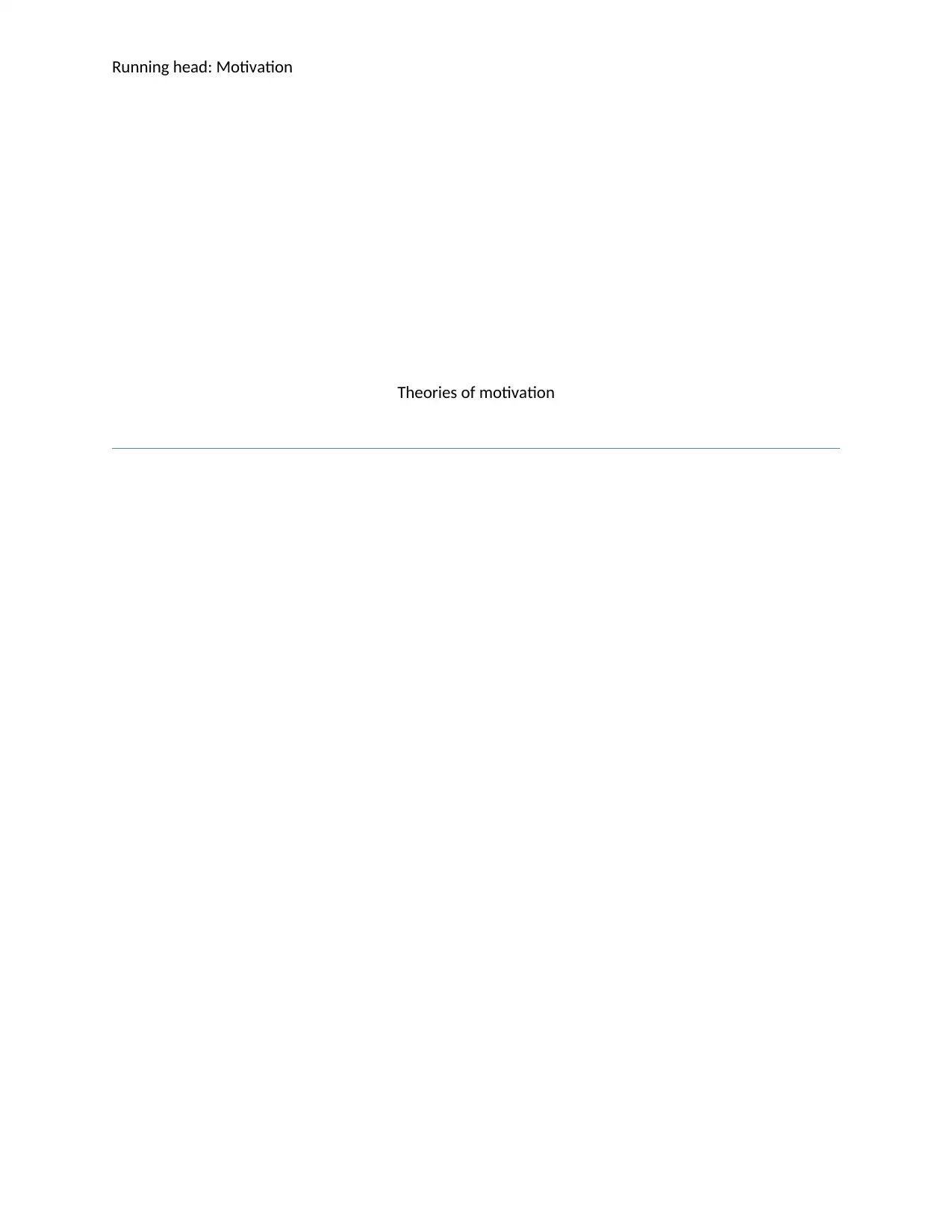
Running head: Motivation
Theories of motivation
Theories of motivation
Paraphrase This Document
Need a fresh take? Get an instant paraphrase of this document with our AI Paraphraser
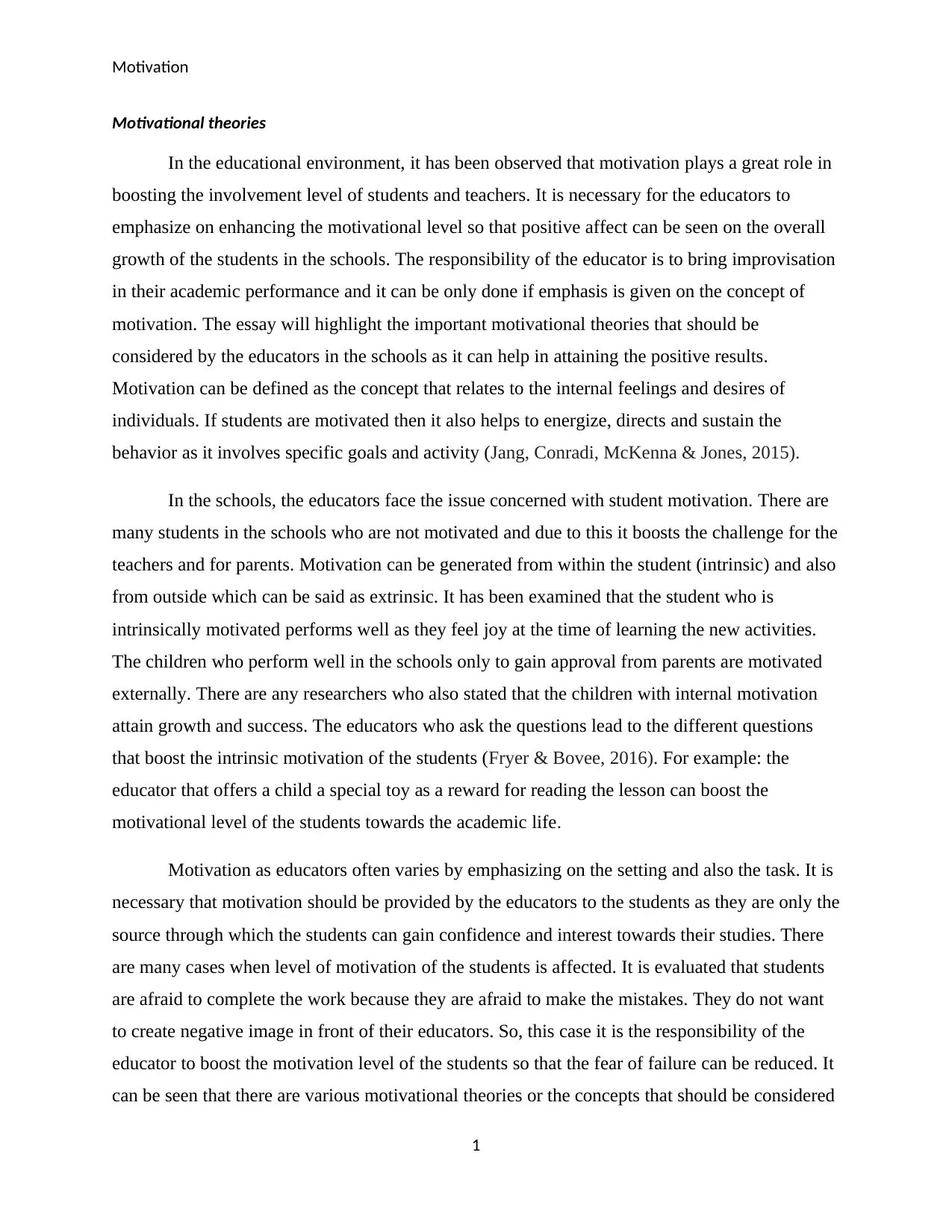
Motivation
Motivational theories
In the educational environment, it has been observed that motivation plays a great role in
boosting the involvement level of students and teachers. It is necessary for the educators to
emphasize on enhancing the motivational level so that positive affect can be seen on the overall
growth of the students in the schools. The responsibility of the educator is to bring improvisation
in their academic performance and it can be only done if emphasis is given on the concept of
motivation. The essay will highlight the important motivational theories that should be
considered by the educators in the schools as it can help in attaining the positive results.
Motivation can be defined as the concept that relates to the internal feelings and desires of
individuals. If students are motivated then it also helps to energize, directs and sustain the
behavior as it involves specific goals and activity (Jang, Conradi, McKenna & Jones, 2015).
In the schools, the educators face the issue concerned with student motivation. There are
many students in the schools who are not motivated and due to this it boosts the challenge for the
teachers and for parents. Motivation can be generated from within the student (intrinsic) and also
from outside which can be said as extrinsic. It has been examined that the student who is
intrinsically motivated performs well as they feel joy at the time of learning the new activities.
The children who perform well in the schools only to gain approval from parents are motivated
externally. There are any researchers who also stated that the children with internal motivation
attain growth and success. The educators who ask the questions lead to the different questions
that boost the intrinsic motivation of the students (Fryer & Bovee, 2016). For example: the
educator that offers a child a special toy as a reward for reading the lesson can boost the
motivational level of the students towards the academic life.
Motivation as educators often varies by emphasizing on the setting and also the task. It is
necessary that motivation should be provided by the educators to the students as they are only the
source through which the students can gain confidence and interest towards their studies. There
are many cases when level of motivation of the students is affected. It is evaluated that students
are afraid to complete the work because they are afraid to make the mistakes. They do not want
to create negative image in front of their educators. So, this case it is the responsibility of the
educator to boost the motivation level of the students so that the fear of failure can be reduced. It
can be seen that there are various motivational theories or the concepts that should be considered
1
Motivational theories
In the educational environment, it has been observed that motivation plays a great role in
boosting the involvement level of students and teachers. It is necessary for the educators to
emphasize on enhancing the motivational level so that positive affect can be seen on the overall
growth of the students in the schools. The responsibility of the educator is to bring improvisation
in their academic performance and it can be only done if emphasis is given on the concept of
motivation. The essay will highlight the important motivational theories that should be
considered by the educators in the schools as it can help in attaining the positive results.
Motivation can be defined as the concept that relates to the internal feelings and desires of
individuals. If students are motivated then it also helps to energize, directs and sustain the
behavior as it involves specific goals and activity (Jang, Conradi, McKenna & Jones, 2015).
In the schools, the educators face the issue concerned with student motivation. There are
many students in the schools who are not motivated and due to this it boosts the challenge for the
teachers and for parents. Motivation can be generated from within the student (intrinsic) and also
from outside which can be said as extrinsic. It has been examined that the student who is
intrinsically motivated performs well as they feel joy at the time of learning the new activities.
The children who perform well in the schools only to gain approval from parents are motivated
externally. There are any researchers who also stated that the children with internal motivation
attain growth and success. The educators who ask the questions lead to the different questions
that boost the intrinsic motivation of the students (Fryer & Bovee, 2016). For example: the
educator that offers a child a special toy as a reward for reading the lesson can boost the
motivational level of the students towards the academic life.
Motivation as educators often varies by emphasizing on the setting and also the task. It is
necessary that motivation should be provided by the educators to the students as they are only the
source through which the students can gain confidence and interest towards their studies. There
are many cases when level of motivation of the students is affected. It is evaluated that students
are afraid to complete the work because they are afraid to make the mistakes. They do not want
to create negative image in front of their educators. So, this case it is the responsibility of the
educator to boost the motivation level of the students so that the fear of failure can be reduced. It
can be seen that there are various motivational theories or the concepts that should be considered
1
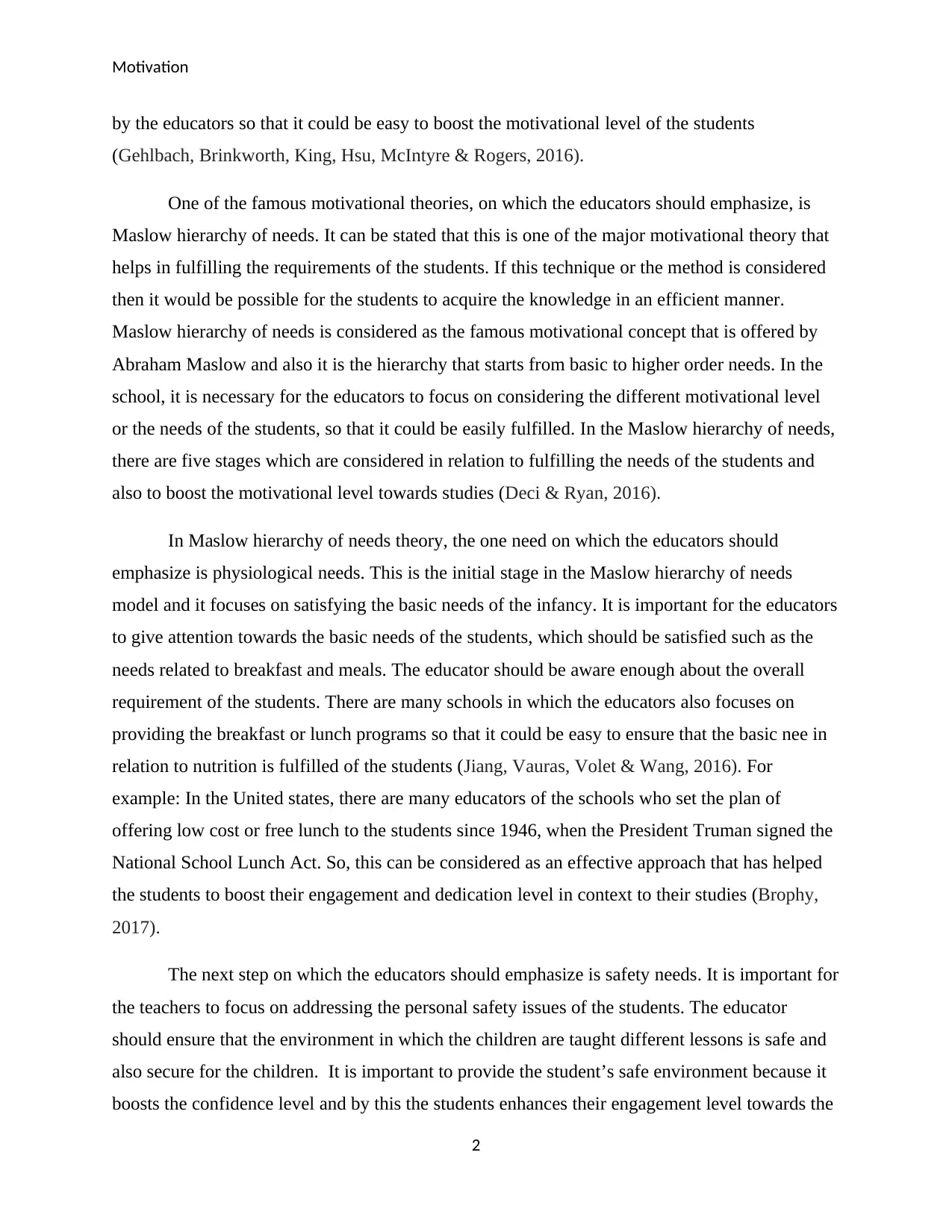
Motivation
by the educators so that it could be easy to boost the motivational level of the students
(Gehlbach, Brinkworth, King, Hsu, McIntyre & Rogers, 2016).
One of the famous motivational theories, on which the educators should emphasize, is
Maslow hierarchy of needs. It can be stated that this is one of the major motivational theory that
helps in fulfilling the requirements of the students. If this technique or the method is considered
then it would be possible for the students to acquire the knowledge in an efficient manner.
Maslow hierarchy of needs is considered as the famous motivational concept that is offered by
Abraham Maslow and also it is the hierarchy that starts from basic to higher order needs. In the
school, it is necessary for the educators to focus on considering the different motivational level
or the needs of the students, so that it could be easily fulfilled. In the Maslow hierarchy of needs,
there are five stages which are considered in relation to fulfilling the needs of the students and
also to boost the motivational level towards studies (Deci & Ryan, 2016).
In Maslow hierarchy of needs theory, the one need on which the educators should
emphasize is physiological needs. This is the initial stage in the Maslow hierarchy of needs
model and it focuses on satisfying the basic needs of the infancy. It is important for the educators
to give attention towards the basic needs of the students, which should be satisfied such as the
needs related to breakfast and meals. The educator should be aware enough about the overall
requirement of the students. There are many schools in which the educators also focuses on
providing the breakfast or lunch programs so that it could be easy to ensure that the basic nee in
relation to nutrition is fulfilled of the students (Jiang, Vauras, Volet & Wang, 2016). For
example: In the United states, there are many educators of the schools who set the plan of
offering low cost or free lunch to the students since 1946, when the President Truman signed the
National School Lunch Act. So, this can be considered as an effective approach that has helped
the students to boost their engagement and dedication level in context to their studies (Brophy,
2017).
The next step on which the educators should emphasize is safety needs. It is important for
the teachers to focus on addressing the personal safety issues of the students. The educator
should ensure that the environment in which the children are taught different lessons is safe and
also secure for the children. It is important to provide the student’s safe environment because it
boosts the confidence level and by this the students enhances their engagement level towards the
2
by the educators so that it could be easy to boost the motivational level of the students
(Gehlbach, Brinkworth, King, Hsu, McIntyre & Rogers, 2016).
One of the famous motivational theories, on which the educators should emphasize, is
Maslow hierarchy of needs. It can be stated that this is one of the major motivational theory that
helps in fulfilling the requirements of the students. If this technique or the method is considered
then it would be possible for the students to acquire the knowledge in an efficient manner.
Maslow hierarchy of needs is considered as the famous motivational concept that is offered by
Abraham Maslow and also it is the hierarchy that starts from basic to higher order needs. In the
school, it is necessary for the educators to focus on considering the different motivational level
or the needs of the students, so that it could be easily fulfilled. In the Maslow hierarchy of needs,
there are five stages which are considered in relation to fulfilling the needs of the students and
also to boost the motivational level towards studies (Deci & Ryan, 2016).
In Maslow hierarchy of needs theory, the one need on which the educators should
emphasize is physiological needs. This is the initial stage in the Maslow hierarchy of needs
model and it focuses on satisfying the basic needs of the infancy. It is important for the educators
to give attention towards the basic needs of the students, which should be satisfied such as the
needs related to breakfast and meals. The educator should be aware enough about the overall
requirement of the students. There are many schools in which the educators also focuses on
providing the breakfast or lunch programs so that it could be easy to ensure that the basic nee in
relation to nutrition is fulfilled of the students (Jiang, Vauras, Volet & Wang, 2016). For
example: In the United states, there are many educators of the schools who set the plan of
offering low cost or free lunch to the students since 1946, when the President Truman signed the
National School Lunch Act. So, this can be considered as an effective approach that has helped
the students to boost their engagement and dedication level in context to their studies (Brophy,
2017).
The next step on which the educators should emphasize is safety needs. It is important for
the teachers to focus on addressing the personal safety issues of the students. The educator
should ensure that the environment in which the children are taught different lessons is safe and
also secure for the children. It is important to provide the student’s safe environment because it
boosts the confidence level and by this the students enhances their engagement level towards the
2
⊘ This is a preview!⊘
Do you want full access?
Subscribe today to unlock all pages.

Trusted by 1+ million students worldwide
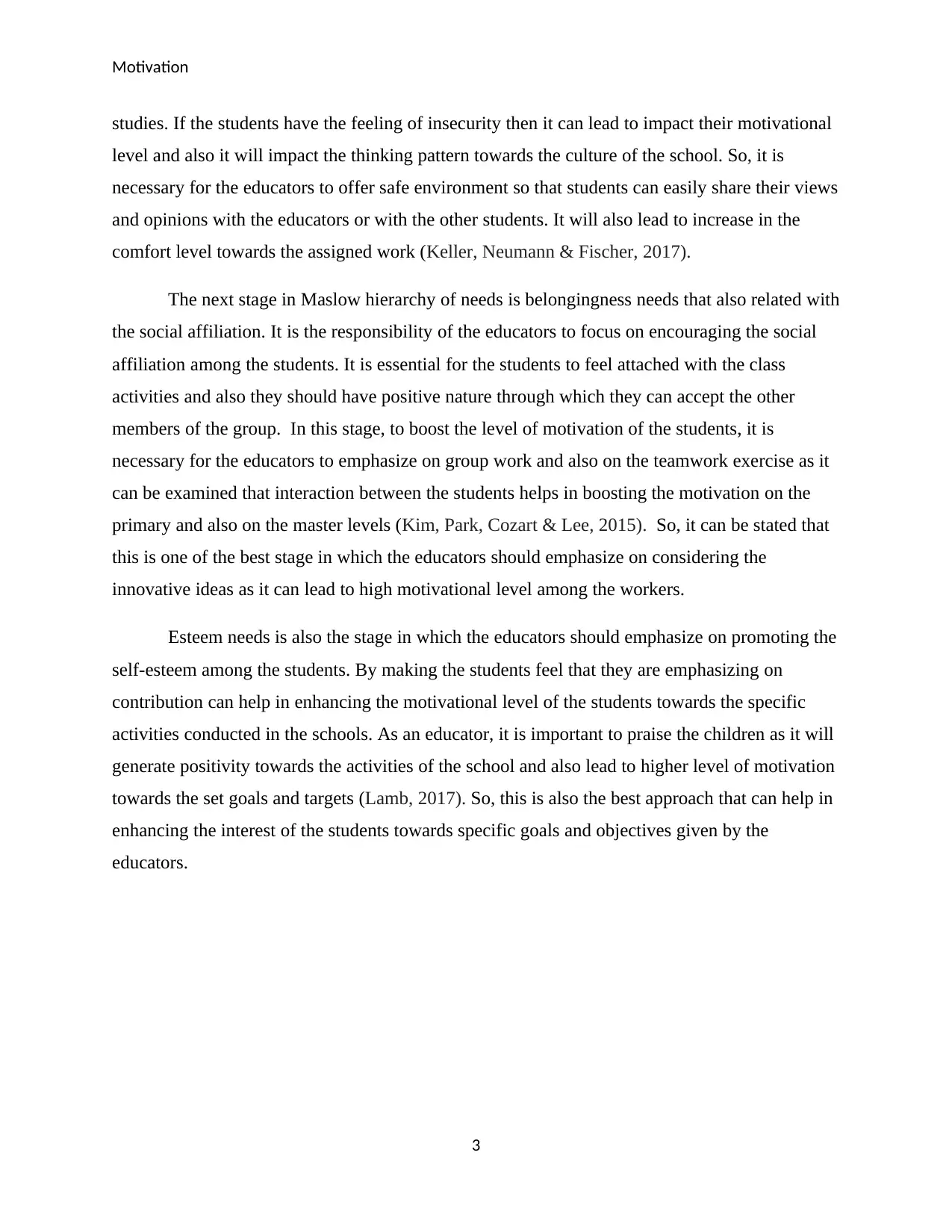
Motivation
studies. If the students have the feeling of insecurity then it can lead to impact their motivational
level and also it will impact the thinking pattern towards the culture of the school. So, it is
necessary for the educators to offer safe environment so that students can easily share their views
and opinions with the educators or with the other students. It will also lead to increase in the
comfort level towards the assigned work (Keller, Neumann & Fischer, 2017).
The next stage in Maslow hierarchy of needs is belongingness needs that also related with
the social affiliation. It is the responsibility of the educators to focus on encouraging the social
affiliation among the students. It is essential for the students to feel attached with the class
activities and also they should have positive nature through which they can accept the other
members of the group. In this stage, to boost the level of motivation of the students, it is
necessary for the educators to emphasize on group work and also on the teamwork exercise as it
can be examined that interaction between the students helps in boosting the motivation on the
primary and also on the master levels (Kim, Park, Cozart & Lee, 2015). So, it can be stated that
this is one of the best stage in which the educators should emphasize on considering the
innovative ideas as it can lead to high motivational level among the workers.
Esteem needs is also the stage in which the educators should emphasize on promoting the
self-esteem among the students. By making the students feel that they are emphasizing on
contribution can help in enhancing the motivational level of the students towards the specific
activities conducted in the schools. As an educator, it is important to praise the children as it will
generate positivity towards the activities of the school and also lead to higher level of motivation
towards the set goals and targets (Lamb, 2017). So, this is also the best approach that can help in
enhancing the interest of the students towards specific goals and objectives given by the
educators.
3
studies. If the students have the feeling of insecurity then it can lead to impact their motivational
level and also it will impact the thinking pattern towards the culture of the school. So, it is
necessary for the educators to offer safe environment so that students can easily share their views
and opinions with the educators or with the other students. It will also lead to increase in the
comfort level towards the assigned work (Keller, Neumann & Fischer, 2017).
The next stage in Maslow hierarchy of needs is belongingness needs that also related with
the social affiliation. It is the responsibility of the educators to focus on encouraging the social
affiliation among the students. It is essential for the students to feel attached with the class
activities and also they should have positive nature through which they can accept the other
members of the group. In this stage, to boost the level of motivation of the students, it is
necessary for the educators to emphasize on group work and also on the teamwork exercise as it
can be examined that interaction between the students helps in boosting the motivation on the
primary and also on the master levels (Kim, Park, Cozart & Lee, 2015). So, it can be stated that
this is one of the best stage in which the educators should emphasize on considering the
innovative ideas as it can lead to high motivational level among the workers.
Esteem needs is also the stage in which the educators should emphasize on promoting the
self-esteem among the students. By making the students feel that they are emphasizing on
contribution can help in enhancing the motivational level of the students towards the specific
activities conducted in the schools. As an educator, it is important to praise the children as it will
generate positivity towards the activities of the school and also lead to higher level of motivation
towards the set goals and targets (Lamb, 2017). So, this is also the best approach that can help in
enhancing the interest of the students towards specific goals and objectives given by the
educators.
3
Paraphrase This Document
Need a fresh take? Get an instant paraphrase of this document with our AI Paraphraser
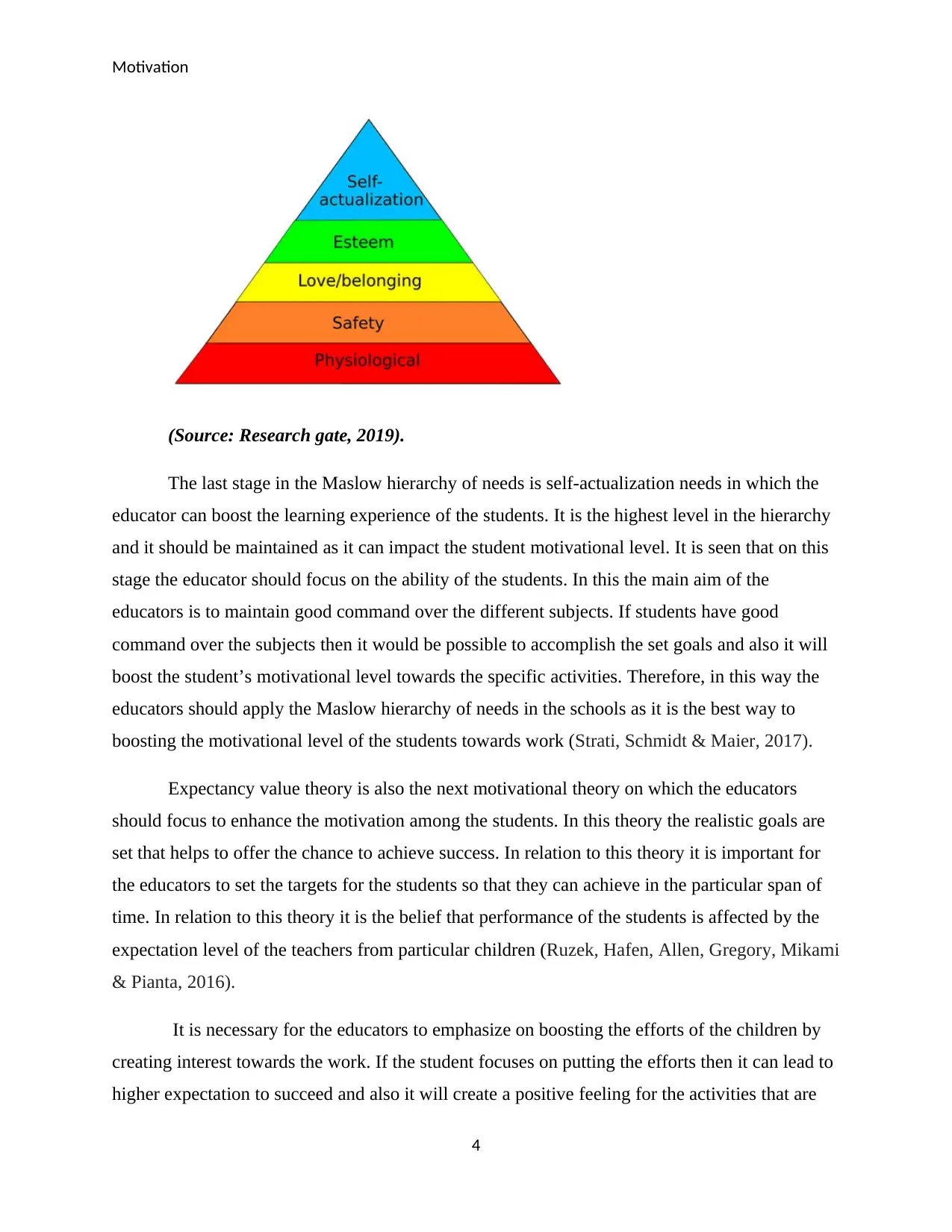
Motivation
(Source: Research gate, 2019).
The last stage in the Maslow hierarchy of needs is self-actualization needs in which the
educator can boost the learning experience of the students. It is the highest level in the hierarchy
and it should be maintained as it can impact the student motivational level. It is seen that on this
stage the educator should focus on the ability of the students. In this the main aim of the
educators is to maintain good command over the different subjects. If students have good
command over the subjects then it would be possible to accomplish the set goals and also it will
boost the student’s motivational level towards the specific activities. Therefore, in this way the
educators should apply the Maslow hierarchy of needs in the schools as it is the best way to
boosting the motivational level of the students towards work (Strati, Schmidt & Maier, 2017).
Expectancy value theory is also the next motivational theory on which the educators
should focus to enhance the motivation among the students. In this theory the realistic goals are
set that helps to offer the chance to achieve success. In relation to this theory it is important for
the educators to set the targets for the students so that they can achieve in the particular span of
time. In relation to this theory it is the belief that performance of the students is affected by the
expectation level of the teachers from particular children (Ruzek, Hafen, Allen, Gregory, Mikami
& Pianta, 2016).
It is necessary for the educators to emphasize on boosting the efforts of the children by
creating interest towards the work. If the student focuses on putting the efforts then it can lead to
higher expectation to succeed and also it will create a positive feeling for the activities that are
4
(Source: Research gate, 2019).
The last stage in the Maslow hierarchy of needs is self-actualization needs in which the
educator can boost the learning experience of the students. It is the highest level in the hierarchy
and it should be maintained as it can impact the student motivational level. It is seen that on this
stage the educator should focus on the ability of the students. In this the main aim of the
educators is to maintain good command over the different subjects. If students have good
command over the subjects then it would be possible to accomplish the set goals and also it will
boost the student’s motivational level towards the specific activities. Therefore, in this way the
educators should apply the Maslow hierarchy of needs in the schools as it is the best way to
boosting the motivational level of the students towards work (Strati, Schmidt & Maier, 2017).
Expectancy value theory is also the next motivational theory on which the educators
should focus to enhance the motivation among the students. In this theory the realistic goals are
set that helps to offer the chance to achieve success. In relation to this theory it is important for
the educators to set the targets for the students so that they can achieve in the particular span of
time. In relation to this theory it is the belief that performance of the students is affected by the
expectation level of the teachers from particular children (Ruzek, Hafen, Allen, Gregory, Mikami
& Pianta, 2016).
It is necessary for the educators to emphasize on boosting the efforts of the children by
creating interest towards the work. If the student focuses on putting the efforts then it can lead to
higher expectation to succeed and also it will create a positive feeling for the activities that are
4
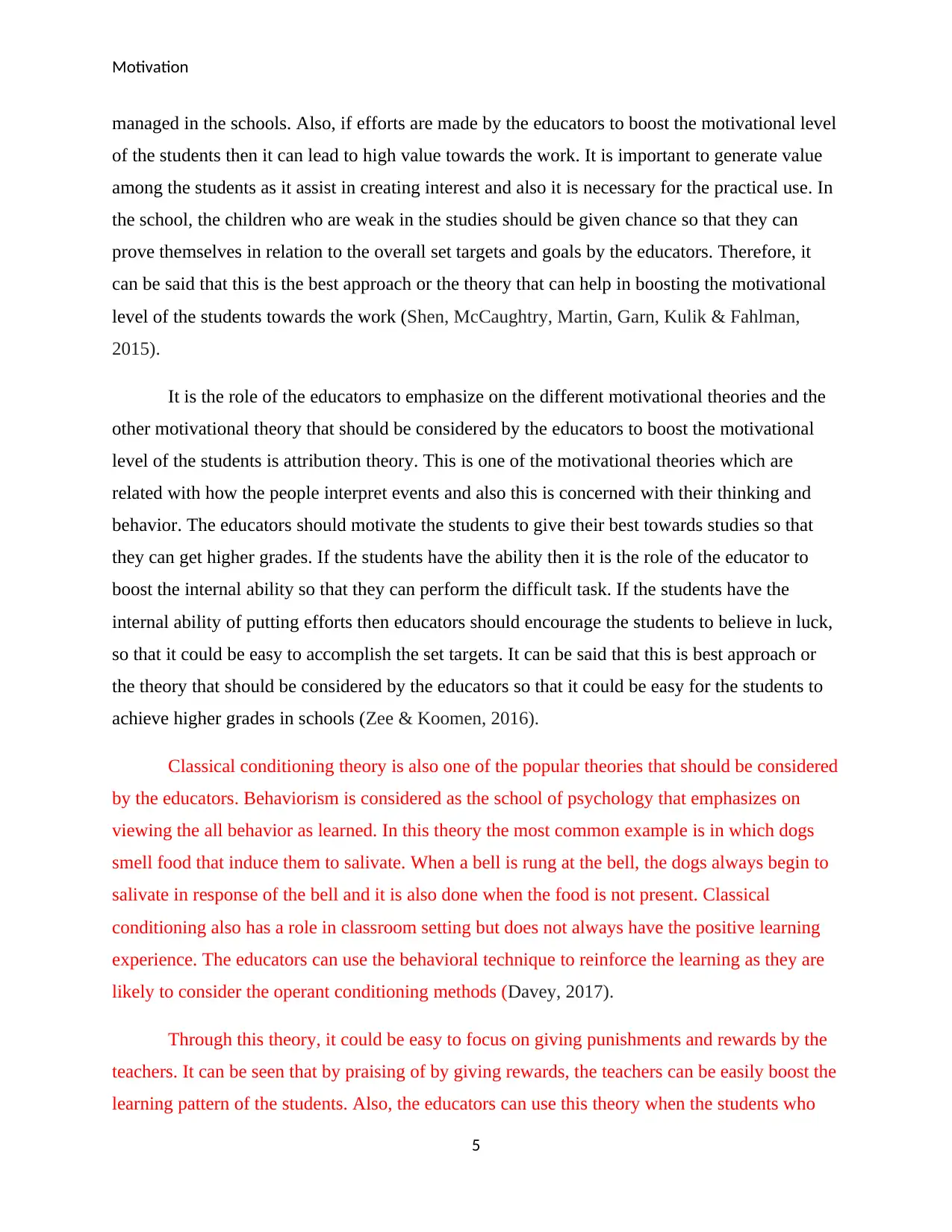
Motivation
managed in the schools. Also, if efforts are made by the educators to boost the motivational level
of the students then it can lead to high value towards the work. It is important to generate value
among the students as it assist in creating interest and also it is necessary for the practical use. In
the school, the children who are weak in the studies should be given chance so that they can
prove themselves in relation to the overall set targets and goals by the educators. Therefore, it
can be said that this is the best approach or the theory that can help in boosting the motivational
level of the students towards the work (Shen, McCaughtry, Martin, Garn, Kulik & Fahlman,
2015).
It is the role of the educators to emphasize on the different motivational theories and the
other motivational theory that should be considered by the educators to boost the motivational
level of the students is attribution theory. This is one of the motivational theories which are
related with how the people interpret events and also this is concerned with their thinking and
behavior. The educators should motivate the students to give their best towards studies so that
they can get higher grades. If the students have the ability then it is the role of the educator to
boost the internal ability so that they can perform the difficult task. If the students have the
internal ability of putting efforts then educators should encourage the students to believe in luck,
so that it could be easy to accomplish the set targets. It can be said that this is best approach or
the theory that should be considered by the educators so that it could be easy for the students to
achieve higher grades in schools (Zee & Koomen, 2016).
Classical conditioning theory is also one of the popular theories that should be considered
by the educators. Behaviorism is considered as the school of psychology that emphasizes on
viewing the all behavior as learned. In this theory the most common example is in which dogs
smell food that induce them to salivate. When a bell is rung at the bell, the dogs always begin to
salivate in response of the bell and it is also done when the food is not present. Classical
conditioning also has a role in classroom setting but does not always have the positive learning
experience. The educators can use the behavioral technique to reinforce the learning as they are
likely to consider the operant conditioning methods (Davey, 2017).
Through this theory, it could be easy to focus on giving punishments and rewards by the
teachers. It can be seen that by praising of by giving rewards, the teachers can be easily boost the
learning pattern of the students. Also, the educators can use this theory when the students who
5
managed in the schools. Also, if efforts are made by the educators to boost the motivational level
of the students then it can lead to high value towards the work. It is important to generate value
among the students as it assist in creating interest and also it is necessary for the practical use. In
the school, the children who are weak in the studies should be given chance so that they can
prove themselves in relation to the overall set targets and goals by the educators. Therefore, it
can be said that this is the best approach or the theory that can help in boosting the motivational
level of the students towards the work (Shen, McCaughtry, Martin, Garn, Kulik & Fahlman,
2015).
It is the role of the educators to emphasize on the different motivational theories and the
other motivational theory that should be considered by the educators to boost the motivational
level of the students is attribution theory. This is one of the motivational theories which are
related with how the people interpret events and also this is concerned with their thinking and
behavior. The educators should motivate the students to give their best towards studies so that
they can get higher grades. If the students have the ability then it is the role of the educator to
boost the internal ability so that they can perform the difficult task. If the students have the
internal ability of putting efforts then educators should encourage the students to believe in luck,
so that it could be easy to accomplish the set targets. It can be said that this is best approach or
the theory that should be considered by the educators so that it could be easy for the students to
achieve higher grades in schools (Zee & Koomen, 2016).
Classical conditioning theory is also one of the popular theories that should be considered
by the educators. Behaviorism is considered as the school of psychology that emphasizes on
viewing the all behavior as learned. In this theory the most common example is in which dogs
smell food that induce them to salivate. When a bell is rung at the bell, the dogs always begin to
salivate in response of the bell and it is also done when the food is not present. Classical
conditioning also has a role in classroom setting but does not always have the positive learning
experience. The educators can use the behavioral technique to reinforce the learning as they are
likely to consider the operant conditioning methods (Davey, 2017).
Through this theory, it could be easy to focus on giving punishments and rewards by the
teachers. It can be seen that by praising of by giving rewards, the teachers can be easily boost the
learning pattern of the students. Also, the educators can use this theory when the students who
5
⊘ This is a preview!⊘
Do you want full access?
Subscribe today to unlock all pages.

Trusted by 1+ million students worldwide
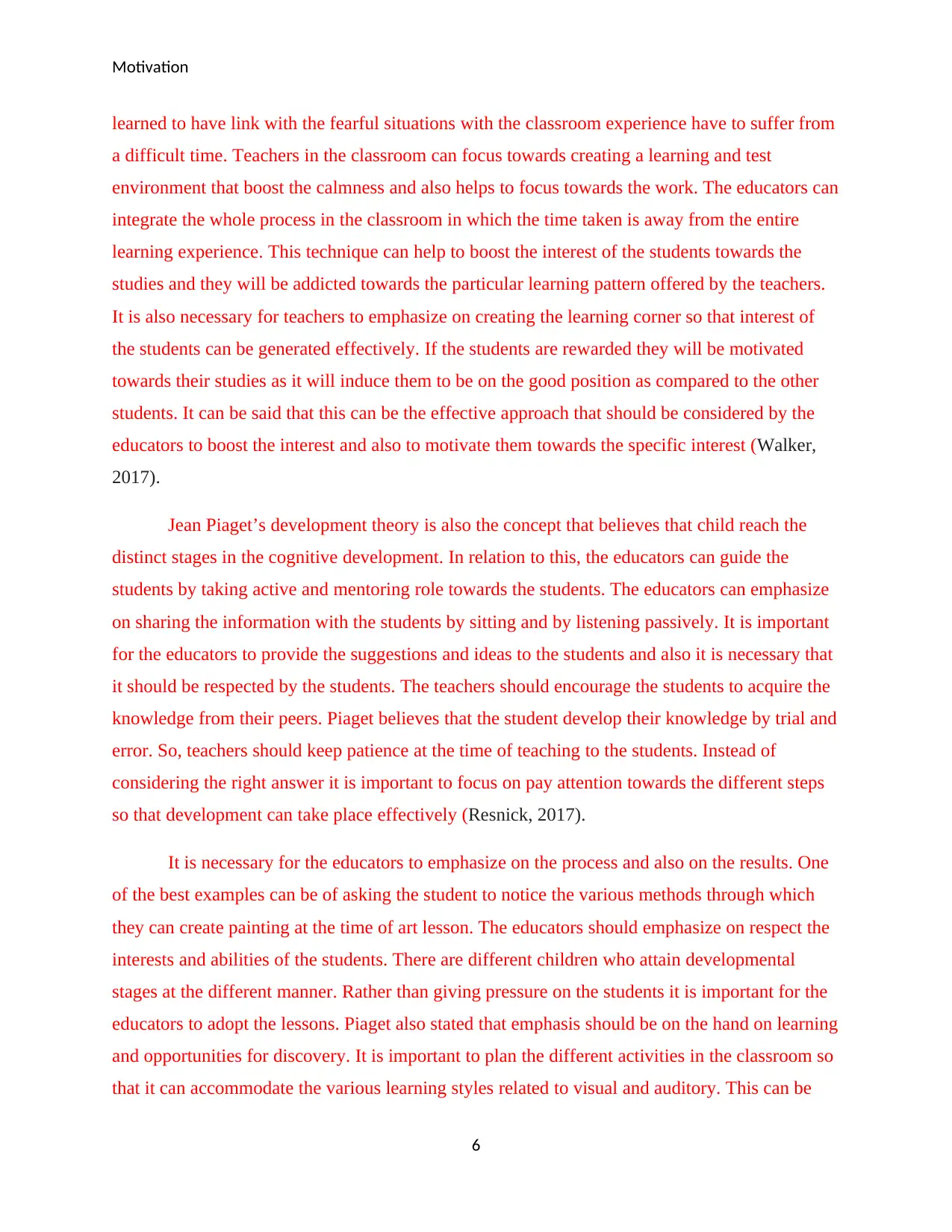
Motivation
learned to have link with the fearful situations with the classroom experience have to suffer from
a difficult time. Teachers in the classroom can focus towards creating a learning and test
environment that boost the calmness and also helps to focus towards the work. The educators can
integrate the whole process in the classroom in which the time taken is away from the entire
learning experience. This technique can help to boost the interest of the students towards the
studies and they will be addicted towards the particular learning pattern offered by the teachers.
It is also necessary for teachers to emphasize on creating the learning corner so that interest of
the students can be generated effectively. If the students are rewarded they will be motivated
towards their studies as it will induce them to be on the good position as compared to the other
students. It can be said that this can be the effective approach that should be considered by the
educators to boost the interest and also to motivate them towards the specific interest (Walker,
2017).
Jean Piaget’s development theory is also the concept that believes that child reach the
distinct stages in the cognitive development. In relation to this, the educators can guide the
students by taking active and mentoring role towards the students. The educators can emphasize
on sharing the information with the students by sitting and by listening passively. It is important
for the educators to provide the suggestions and ideas to the students and also it is necessary that
it should be respected by the students. The teachers should encourage the students to acquire the
knowledge from their peers. Piaget believes that the student develop their knowledge by trial and
error. So, teachers should keep patience at the time of teaching to the students. Instead of
considering the right answer it is important to focus on pay attention towards the different steps
so that development can take place effectively (Resnick, 2017).
It is necessary for the educators to emphasize on the process and also on the results. One
of the best examples can be of asking the student to notice the various methods through which
they can create painting at the time of art lesson. The educators should emphasize on respect the
interests and abilities of the students. There are different children who attain developmental
stages at the different manner. Rather than giving pressure on the students it is important for the
educators to adopt the lessons. Piaget also stated that emphasis should be on the hand on learning
and opportunities for discovery. It is important to plan the different activities in the classroom so
that it can accommodate the various learning styles related to visual and auditory. This can be
6
learned to have link with the fearful situations with the classroom experience have to suffer from
a difficult time. Teachers in the classroom can focus towards creating a learning and test
environment that boost the calmness and also helps to focus towards the work. The educators can
integrate the whole process in the classroom in which the time taken is away from the entire
learning experience. This technique can help to boost the interest of the students towards the
studies and they will be addicted towards the particular learning pattern offered by the teachers.
It is also necessary for teachers to emphasize on creating the learning corner so that interest of
the students can be generated effectively. If the students are rewarded they will be motivated
towards their studies as it will induce them to be on the good position as compared to the other
students. It can be said that this can be the effective approach that should be considered by the
educators to boost the interest and also to motivate them towards the specific interest (Walker,
2017).
Jean Piaget’s development theory is also the concept that believes that child reach the
distinct stages in the cognitive development. In relation to this, the educators can guide the
students by taking active and mentoring role towards the students. The educators can emphasize
on sharing the information with the students by sitting and by listening passively. It is important
for the educators to provide the suggestions and ideas to the students and also it is necessary that
it should be respected by the students. The teachers should encourage the students to acquire the
knowledge from their peers. Piaget believes that the student develop their knowledge by trial and
error. So, teachers should keep patience at the time of teaching to the students. Instead of
considering the right answer it is important to focus on pay attention towards the different steps
so that development can take place effectively (Resnick, 2017).
It is necessary for the educators to emphasize on the process and also on the results. One
of the best examples can be of asking the student to notice the various methods through which
they can create painting at the time of art lesson. The educators should emphasize on respect the
interests and abilities of the students. There are different children who attain developmental
stages at the different manner. Rather than giving pressure on the students it is important for the
educators to adopt the lessons. Piaget also stated that emphasis should be on the hand on learning
and opportunities for discovery. It is important to plan the different activities in the classroom so
that it can accommodate the various learning styles related to visual and auditory. This can be
6
Paraphrase This Document
Need a fresh take? Get an instant paraphrase of this document with our AI Paraphraser
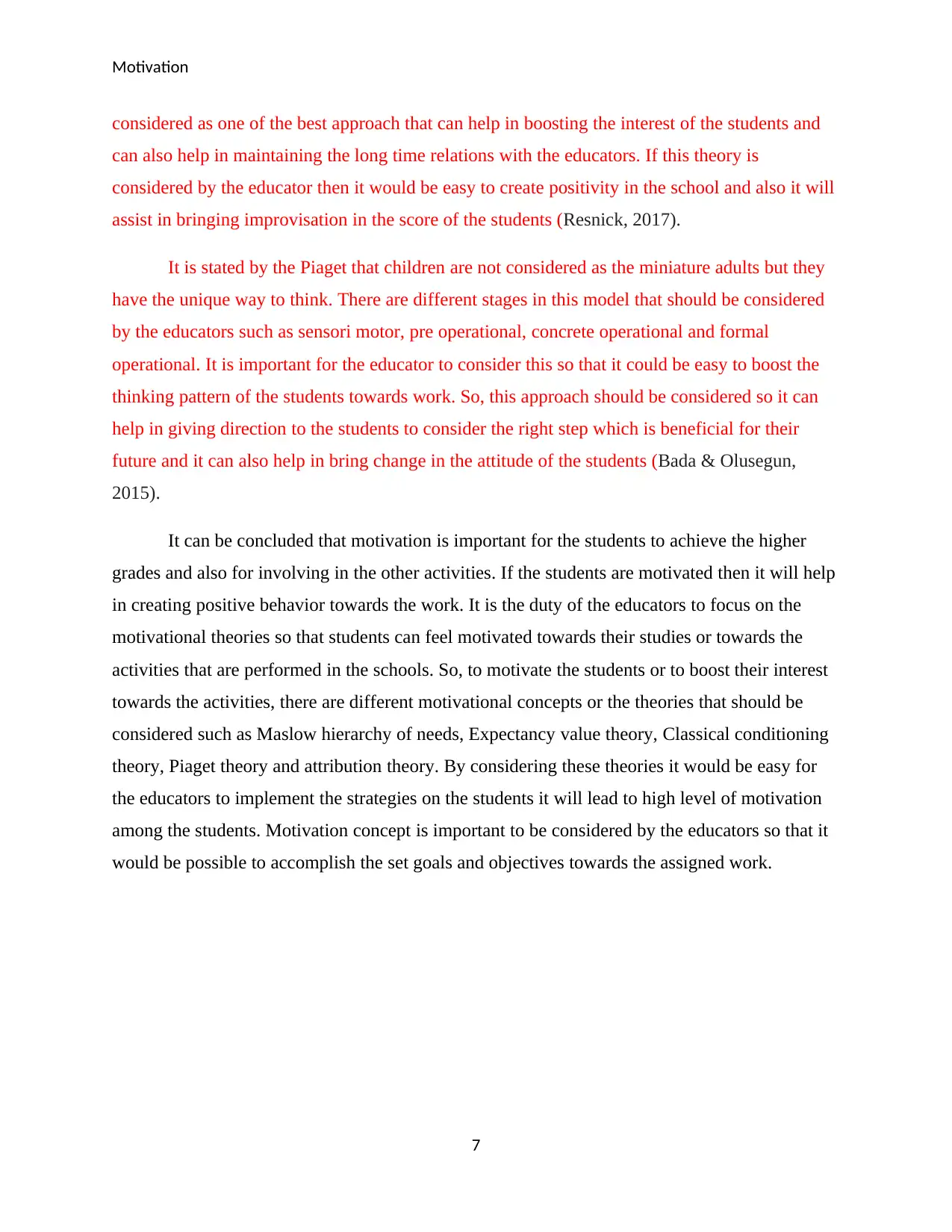
Motivation
considered as one of the best approach that can help in boosting the interest of the students and
can also help in maintaining the long time relations with the educators. If this theory is
considered by the educator then it would be easy to create positivity in the school and also it will
assist in bringing improvisation in the score of the students (Resnick, 2017).
It is stated by the Piaget that children are not considered as the miniature adults but they
have the unique way to think. There are different stages in this model that should be considered
by the educators such as sensori motor, pre operational, concrete operational and formal
operational. It is important for the educator to consider this so that it could be easy to boost the
thinking pattern of the students towards work. So, this approach should be considered so it can
help in giving direction to the students to consider the right step which is beneficial for their
future and it can also help in bring change in the attitude of the students (Bada & Olusegun,
2015).
It can be concluded that motivation is important for the students to achieve the higher
grades and also for involving in the other activities. If the students are motivated then it will help
in creating positive behavior towards the work. It is the duty of the educators to focus on the
motivational theories so that students can feel motivated towards their studies or towards the
activities that are performed in the schools. So, to motivate the students or to boost their interest
towards the activities, there are different motivational concepts or the theories that should be
considered such as Maslow hierarchy of needs, Expectancy value theory, Classical conditioning
theory, Piaget theory and attribution theory. By considering these theories it would be easy for
the educators to implement the strategies on the students it will lead to high level of motivation
among the students. Motivation concept is important to be considered by the educators so that it
would be possible to accomplish the set goals and objectives towards the assigned work.
7
considered as one of the best approach that can help in boosting the interest of the students and
can also help in maintaining the long time relations with the educators. If this theory is
considered by the educator then it would be easy to create positivity in the school and also it will
assist in bringing improvisation in the score of the students (Resnick, 2017).
It is stated by the Piaget that children are not considered as the miniature adults but they
have the unique way to think. There are different stages in this model that should be considered
by the educators such as sensori motor, pre operational, concrete operational and formal
operational. It is important for the educator to consider this so that it could be easy to boost the
thinking pattern of the students towards work. So, this approach should be considered so it can
help in giving direction to the students to consider the right step which is beneficial for their
future and it can also help in bring change in the attitude of the students (Bada & Olusegun,
2015).
It can be concluded that motivation is important for the students to achieve the higher
grades and also for involving in the other activities. If the students are motivated then it will help
in creating positive behavior towards the work. It is the duty of the educators to focus on the
motivational theories so that students can feel motivated towards their studies or towards the
activities that are performed in the schools. So, to motivate the students or to boost their interest
towards the activities, there are different motivational concepts or the theories that should be
considered such as Maslow hierarchy of needs, Expectancy value theory, Classical conditioning
theory, Piaget theory and attribution theory. By considering these theories it would be easy for
the educators to implement the strategies on the students it will lead to high level of motivation
among the students. Motivation concept is important to be considered by the educators so that it
would be possible to accomplish the set goals and objectives towards the assigned work.
7
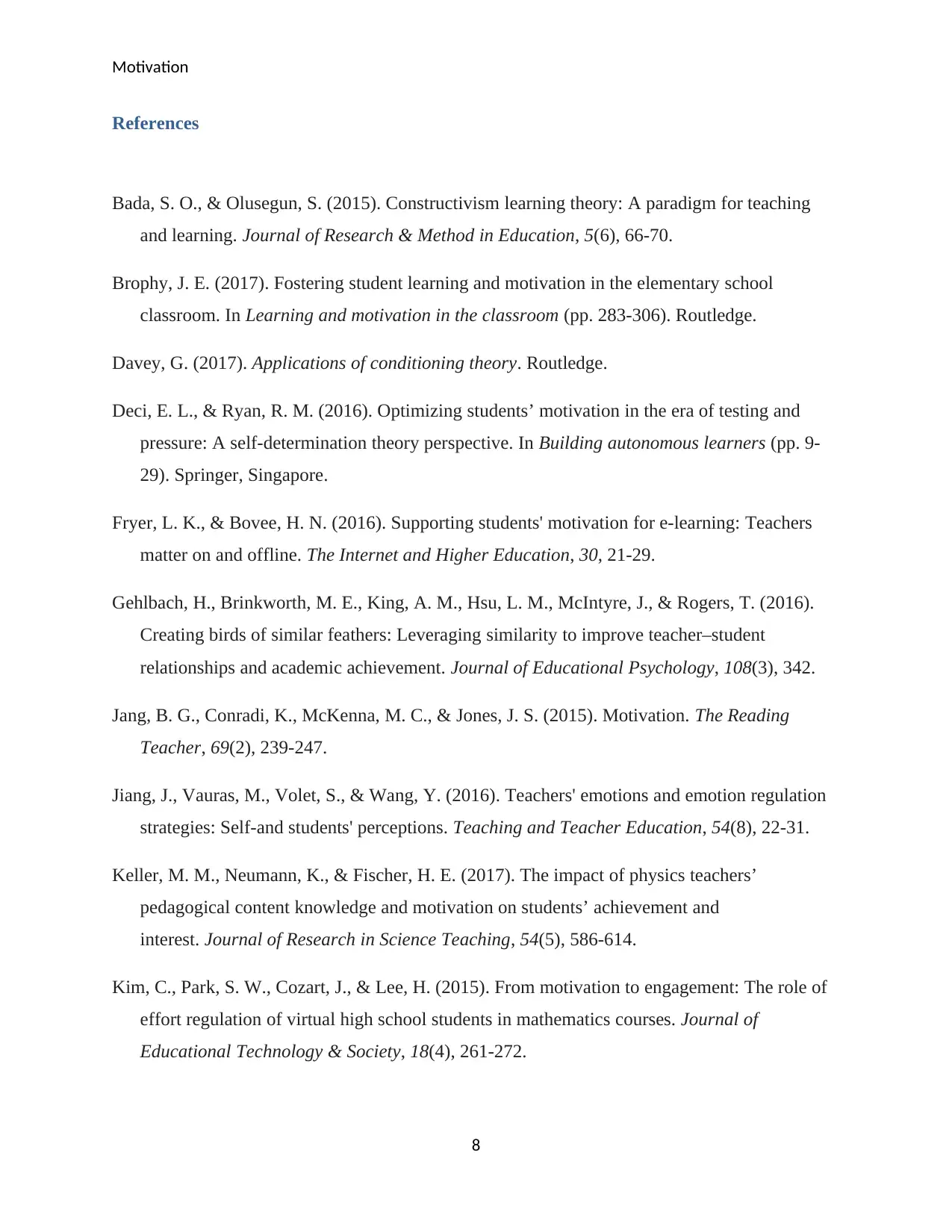
Motivation
References
Bada, S. O., & Olusegun, S. (2015). Constructivism learning theory: A paradigm for teaching
and learning. Journal of Research & Method in Education, 5(6), 66-70.
Brophy, J. E. (2017). Fostering student learning and motivation in the elementary school
classroom. In Learning and motivation in the classroom (pp. 283-306). Routledge.
Davey, G. (2017). Applications of conditioning theory. Routledge.
Deci, E. L., & Ryan, R. M. (2016). Optimizing students’ motivation in the era of testing and
pressure: A self-determination theory perspective. In Building autonomous learners (pp. 9-
29). Springer, Singapore.
Fryer, L. K., & Bovee, H. N. (2016). Supporting students' motivation for e-learning: Teachers
matter on and offline. The Internet and Higher Education, 30, 21-29.
Gehlbach, H., Brinkworth, M. E., King, A. M., Hsu, L. M., McIntyre, J., & Rogers, T. (2016).
Creating birds of similar feathers: Leveraging similarity to improve teacher–student
relationships and academic achievement. Journal of Educational Psychology, 108(3), 342.
Jang, B. G., Conradi, K., McKenna, M. C., & Jones, J. S. (2015). Motivation. The Reading
Teacher, 69(2), 239-247.
Jiang, J., Vauras, M., Volet, S., & Wang, Y. (2016). Teachers' emotions and emotion regulation
strategies: Self-and students' perceptions. Teaching and Teacher Education, 54(8), 22-31.
Keller, M. M., Neumann, K., & Fischer, H. E. (2017). The impact of physics teachers’
pedagogical content knowledge and motivation on students’ achievement and
interest. Journal of Research in Science Teaching, 54(5), 586-614.
Kim, C., Park, S. W., Cozart, J., & Lee, H. (2015). From motivation to engagement: The role of
effort regulation of virtual high school students in mathematics courses. Journal of
Educational Technology & Society, 18(4), 261-272.
8
References
Bada, S. O., & Olusegun, S. (2015). Constructivism learning theory: A paradigm for teaching
and learning. Journal of Research & Method in Education, 5(6), 66-70.
Brophy, J. E. (2017). Fostering student learning and motivation in the elementary school
classroom. In Learning and motivation in the classroom (pp. 283-306). Routledge.
Davey, G. (2017). Applications of conditioning theory. Routledge.
Deci, E. L., & Ryan, R. M. (2016). Optimizing students’ motivation in the era of testing and
pressure: A self-determination theory perspective. In Building autonomous learners (pp. 9-
29). Springer, Singapore.
Fryer, L. K., & Bovee, H. N. (2016). Supporting students' motivation for e-learning: Teachers
matter on and offline. The Internet and Higher Education, 30, 21-29.
Gehlbach, H., Brinkworth, M. E., King, A. M., Hsu, L. M., McIntyre, J., & Rogers, T. (2016).
Creating birds of similar feathers: Leveraging similarity to improve teacher–student
relationships and academic achievement. Journal of Educational Psychology, 108(3), 342.
Jang, B. G., Conradi, K., McKenna, M. C., & Jones, J. S. (2015). Motivation. The Reading
Teacher, 69(2), 239-247.
Jiang, J., Vauras, M., Volet, S., & Wang, Y. (2016). Teachers' emotions and emotion regulation
strategies: Self-and students' perceptions. Teaching and Teacher Education, 54(8), 22-31.
Keller, M. M., Neumann, K., & Fischer, H. E. (2017). The impact of physics teachers’
pedagogical content knowledge and motivation on students’ achievement and
interest. Journal of Research in Science Teaching, 54(5), 586-614.
Kim, C., Park, S. W., Cozart, J., & Lee, H. (2015). From motivation to engagement: The role of
effort regulation of virtual high school students in mathematics courses. Journal of
Educational Technology & Society, 18(4), 261-272.
8
⊘ This is a preview!⊘
Do you want full access?
Subscribe today to unlock all pages.

Trusted by 1+ million students worldwide
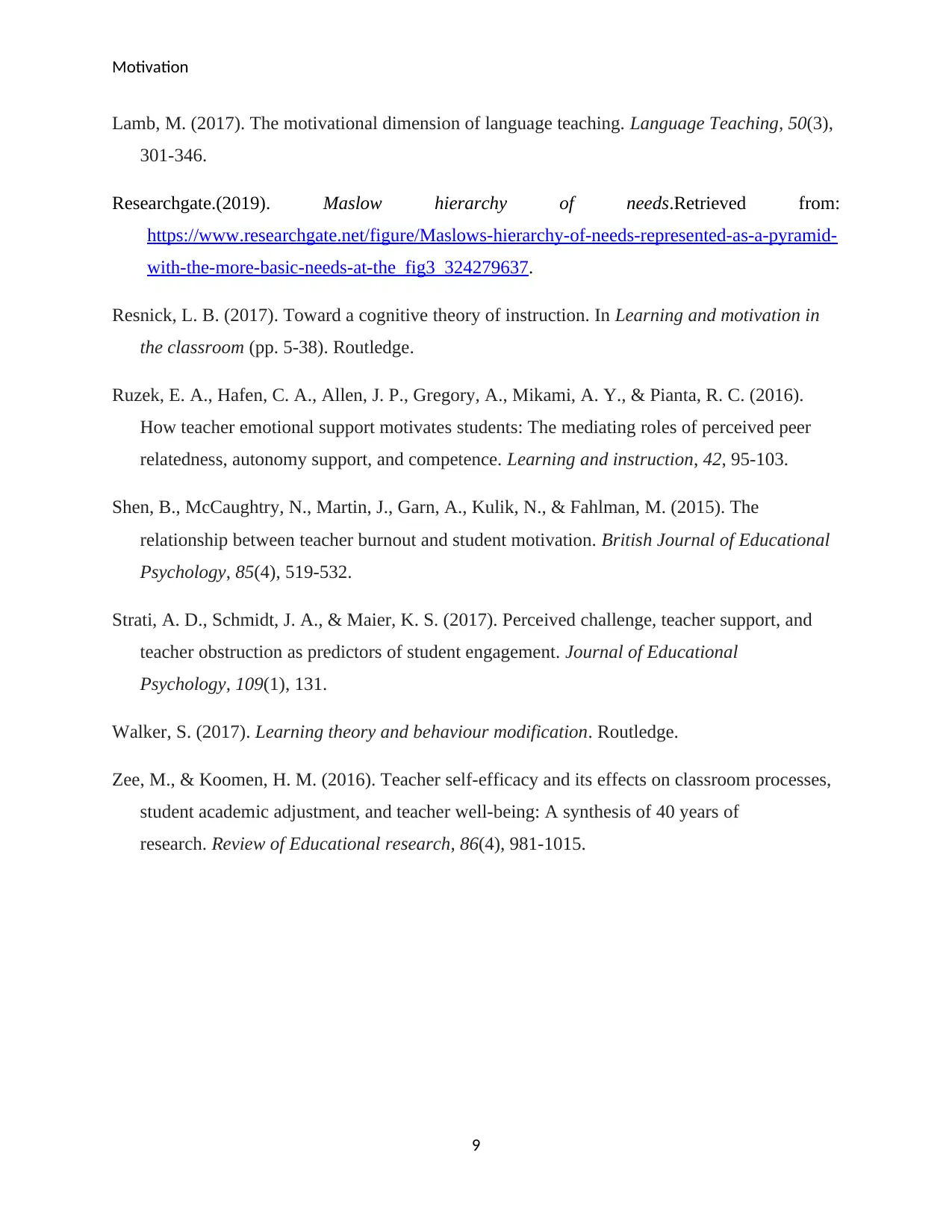
Motivation
Lamb, M. (2017). The motivational dimension of language teaching. Language Teaching, 50(3),
301-346.
Researchgate.(2019). Maslow hierarchy of needs.Retrieved from:
https://www.researchgate.net/figure/Maslows-hierarchy-of-needs-represented-as-a-pyramid-
with-the-more-basic-needs-at-the_fig3_324279637.
Resnick, L. B. (2017). Toward a cognitive theory of instruction. In Learning and motivation in
the classroom (pp. 5-38). Routledge.
Ruzek, E. A., Hafen, C. A., Allen, J. P., Gregory, A., Mikami, A. Y., & Pianta, R. C. (2016).
How teacher emotional support motivates students: The mediating roles of perceived peer
relatedness, autonomy support, and competence. Learning and instruction, 42, 95-103.
Shen, B., McCaughtry, N., Martin, J., Garn, A., Kulik, N., & Fahlman, M. (2015). The
relationship between teacher burnout and student motivation. British Journal of Educational
Psychology, 85(4), 519-532.
Strati, A. D., Schmidt, J. A., & Maier, K. S. (2017). Perceived challenge, teacher support, and
teacher obstruction as predictors of student engagement. Journal of Educational
Psychology, 109(1), 131.
Walker, S. (2017). Learning theory and behaviour modification. Routledge.
Zee, M., & Koomen, H. M. (2016). Teacher self-efficacy and its effects on classroom processes,
student academic adjustment, and teacher well-being: A synthesis of 40 years of
research. Review of Educational research, 86(4), 981-1015.
9
Lamb, M. (2017). The motivational dimension of language teaching. Language Teaching, 50(3),
301-346.
Researchgate.(2019). Maslow hierarchy of needs.Retrieved from:
https://www.researchgate.net/figure/Maslows-hierarchy-of-needs-represented-as-a-pyramid-
with-the-more-basic-needs-at-the_fig3_324279637.
Resnick, L. B. (2017). Toward a cognitive theory of instruction. In Learning and motivation in
the classroom (pp. 5-38). Routledge.
Ruzek, E. A., Hafen, C. A., Allen, J. P., Gregory, A., Mikami, A. Y., & Pianta, R. C. (2016).
How teacher emotional support motivates students: The mediating roles of perceived peer
relatedness, autonomy support, and competence. Learning and instruction, 42, 95-103.
Shen, B., McCaughtry, N., Martin, J., Garn, A., Kulik, N., & Fahlman, M. (2015). The
relationship between teacher burnout and student motivation. British Journal of Educational
Psychology, 85(4), 519-532.
Strati, A. D., Schmidt, J. A., & Maier, K. S. (2017). Perceived challenge, teacher support, and
teacher obstruction as predictors of student engagement. Journal of Educational
Psychology, 109(1), 131.
Walker, S. (2017). Learning theory and behaviour modification. Routledge.
Zee, M., & Koomen, H. M. (2016). Teacher self-efficacy and its effects on classroom processes,
student academic adjustment, and teacher well-being: A synthesis of 40 years of
research. Review of Educational research, 86(4), 981-1015.
9
1 out of 10
Related Documents
Your All-in-One AI-Powered Toolkit for Academic Success.
+13062052269
info@desklib.com
Available 24*7 on WhatsApp / Email
![[object Object]](/_next/static/media/star-bottom.7253800d.svg)
Unlock your academic potential
Copyright © 2020–2025 A2Z Services. All Rights Reserved. Developed and managed by ZUCOL.




